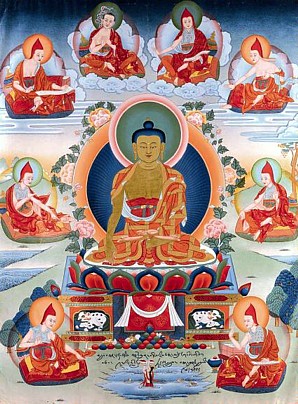Two Supreme Ones: Difference between revisions
Jump to navigation
Jump to search
No edit summary |
mNo edit summary |
||
| Line 1: | Line 1: | ||
<noinclude>[[Image:Buddha and 6 Ornaments 2 Supreme.jpg|frame|[[Buddha]] with the [[Six Ornaments]] and Two Supreme Ones]] | <noinclude>[[Image:Buddha and 6 Ornaments 2 Supreme.jpg|frame|[[Buddha]] with the [[Six Ornaments]] and Two Supreme Ones]] | ||
'''Two Supreme Ones''' (Tib. [[མཆོག་གཉིས་]], ''chok nyi'' | '''Two Supreme Ones''' (Tib. [[མཆོག་གཉིས་]], ''chok nyi'', [[Wyl.]]'' mchog gnyis'') — | ||
</noinclude>1. According to one way of counting the [[Six Ornaments]] and Two Supreme Ones, this refers to | </noinclude>1. According to one way of counting the [[Six Ornaments]] and Two Supreme Ones, this refers to | ||
*[[Gunaprabha]] | *[[Gunaprabha]] and | ||
*[[Shakyaprabha | *[[Shakyaprabha]]. | ||
2. According to another tradition, this refers to | 2. According to another tradition, this refers to | ||
*[[Nagarjuna | *[[Nagarjuna]], the founder of the tradition of [[Profound View]] and | ||
*[[Asanga | *[[Asanga]], the founder of the tradition of [[Vast Conduct]].<noinclude> | ||
==Internal Links== | ==Internal Links== | ||
Latest revision as of 15:16, 2 September 2018

Two Supreme Ones (Tib. མཆོག་གཉིས་, chok nyi, Wyl. mchog gnyis) —
1. According to one way of counting the Six Ornaments and Two Supreme Ones, this refers to
- Gunaprabha and
- Shakyaprabha.
2. According to another tradition, this refers to
- Nagarjuna, the founder of the tradition of Profound View and
- Asanga, the founder of the tradition of Vast Conduct.